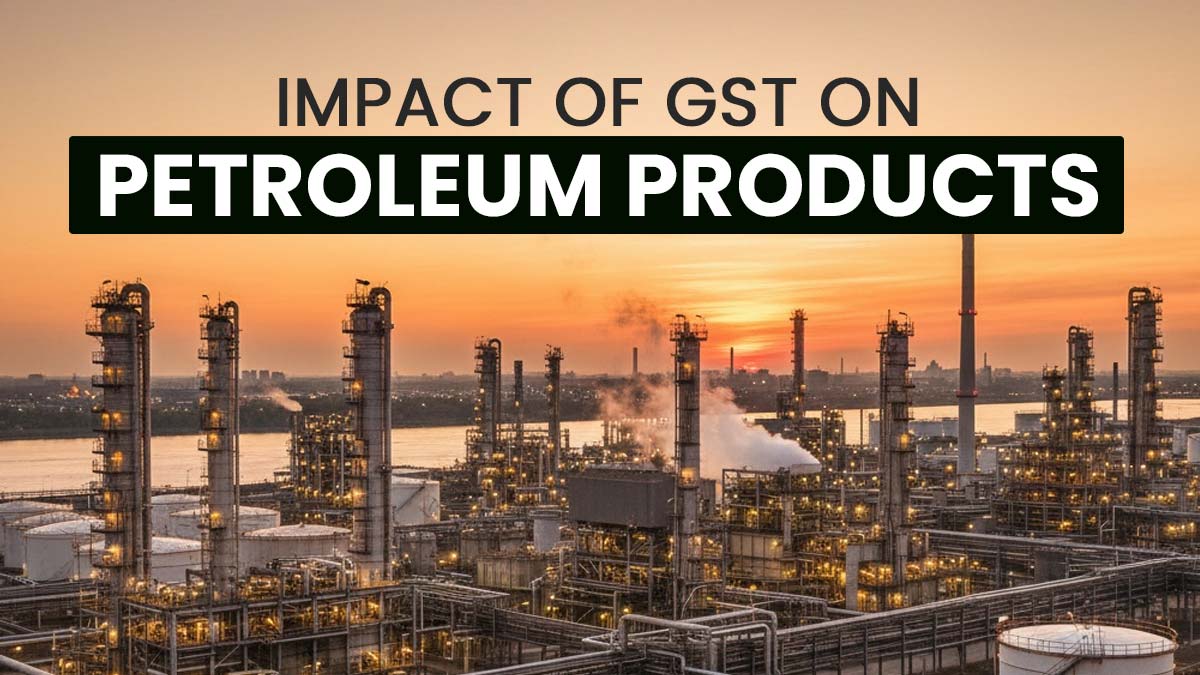
To include petroleum products in GST was a long-pending demand. Towards the same 56th GST Council meeting (September 2025) has been taken an influential step. Before that, products like kerosene, naphtha, and LPG came under the GST ambit, and now the council has approved a phased inclusion of natural gas and aviation turbine fuel (ATF).
Since the states are dependent on the revenue from items like petrol, diesel, and crude oil therefore for the time being it will remain outside the GST.
56th GST Council Update on Petroleum Industry
With constant rates, Natural gas, ATF, and LPG have been brought under GST, and due to state revenue concerns, petrol, diesel, and crude oil stay outside the GST ambit.
| Description | Current GST Rate | New GST Rate From 22nd September |
|---|---|---|
| “Petroleum operations undertaken under petroleum exploration licenses or mining leases, granted by the Government of India or any State Government to the Oil and Natural Gas Corporation or Oil India Limited on nomination basis, or” | 12% | 18% |
| “Petroleum operations undertaken under specified contracts” | 12% | 18% |
| “Petroleum operations undertaken under specified contracts under the New Exploration Licensing Policy” | 12% | 18% |
| “Petroleum operations undertaken under specified contracts under the Marginal Field Policy (MFP)” | 12% | 18% |
| “Coal bed methane operations undertaken under specified contracts under the Coal Bed Methane Policy” | 12% | 18% |
| “Supply of transportation of natural gas, petroleum crude, motor spirit, high speed diesel or ATF through pipeline” | 5% without ITC | 5% without ITC |
| 12% with ITC | 18% with ITC | |
| “Other professional, technical and business services relating to exploration, mining or drilling of petroleum crude or natural gas or both” | 12% with ITC | 18% with ITC |
| “Support services to exploration, mining or drilling of petroleum crude or natural gas or both” | 12% with ITC | 18% with ITC |
Natural Gas and ATF Under GST
Natural gas and aviation fuel (ATF), effective September 2025, have been included in GST with an 18% slab.
For industries such as power, fertilisers, and airlines, the decision is anticipated to lower the Input tax credit blockages.
LPG Under Uniform GST Treatment
Within a uniform GST rate, both domestic and commercial LPG cylinders will now be effective.
Domestic LPG continues to appreciate concessional / exempted treatment; there will be a 5% GST on commercial LPG, superseding the earlier fragmented state-wise taxes.
Petrol, Diesel and Crude Oil
The above shall not be counted under GST. VAT and local sales tax will continue to be charged by the States on these fuels.
It is not easy to immediately include them because of the concerns of the state revenue, though discussions will remain open for future integration, the council considered.
Major Effect on Consumers and Industry
On petroleum products (like LPG and natural gas), a marginal GST rate will lessen cascading taxes and help industries claim input tax credits.
From lower costs and better efficiency, airlines and gas-based industries shall benefit.
Financial and Industrial Impact
- Manufacturing Competitiveness: Under GST, subsuming natural gas and ATF will decrease logistics and input costs, making Indian manufacturing competitive globally.
- Energy Sector Relief: Industries that relied on natural gas, like fertiliser, chemical, and city gas distributors, shall get the advantage of easier GST input tax credit (ITC) flow, which reduces the costs of the project.
- Income Sharing: Since the major tax contributor to States is petroleum, they are cautious. A broader credit chain and overall efficiency gains shall be anticipated if it is included under GST.
Continuing Conversations
The same step has been welcomed under various states, including Madhya Pradesh, but it outlined that petrol and diesel must be brought under GST only after confirming that enough revenue compensation procedures.
As per the Central government, adding all petroleum products to GST remains part of the long-term GST 2.0 objective, though it shall be performed in steps to balance the benefit of the consumers with state revenues.
Closure: Under GST, the 56th GST council meeting had paved the way for petroleum. Natural gas, ATF (Aviation Turbine Fuel), and LPG (Liquefied Petroleum Gas) are now harmonised under the Goods and Services Tax (GST). This change will help industries benefit from lower costs and improved credit flow.
However, petrol, diesel, and crude oil remain outside the GST framework for the time being. This gradual inclusion approach aims to strike a balance between consumer benefits, industrial growth, and the revenue needs of the states.








